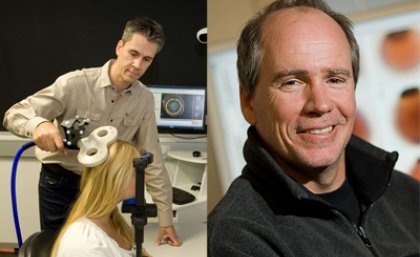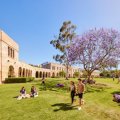
The University of Queensland has been awarded three prestigious Australian Research Council Australia Laureate Fellowships announced today by Federal Science Minister Kim Carr.
UQ is equal first in the country for the number of awards with ANU and the University of Melbourne, who also received three awards.
Open to academics of international repute, the scheme aims to build and strengthen world-class research in Australia by supporting and attracting outstanding Australian and international researchers.
UQ’s Australian Laureate Fellows are among only 17 selected from a national and international field of 139 proposals — a 12.2 per cent success rate.
The UQ fellowships will investigate social identity, gene expression in marine animals and the role of attention in regulating brain function.
One of the University’s new Laureates, Professor Alex Haslam, is one of the United Kingdom’s brightest stars in group theory and its application.
A returning Australian, he has been attracted from the University of Exeter to UQ, where he will be based in the School of Psychology from 2012.
He will join UQ-based Professor Bernie Degnan of the School of Biological Sciences and Professor Jason Mattingley, of the Queensland Brain Institute and School of Psychology.
Each Laureate will receive a major package of grant support, with average funding exceeding AUD2.727 million over five years for each successful UQ Laureate, compared with average funding for all 17 successful Laureates over five years of AUD2.619 million.
UQ Vice-Chancellor Professor Paul Greenfield congratulated Professors Degnan, Haslam and Mattingley.
He said Professor Haslam was a significant gain for Australia, and exemplified the importance of the Laureate scheme.
“Laureate Fellowships support UQ to succeed in the highly-competitive global market for top-tier researchers,” Professor Greenfield said.
“Not only does the program help us attract excellence, it also reinforces UQ’s strategic imperative to hold onto superb researchers who are highly regarded internationally.
“It is a substantial program for reinforcing Australia’s high-end research workforce and the nation’s competitive edge.”
Professor Greenfield said The University of Queensland also achieved success in the first two rounds of the scheme in 2009 and 2010.
Professors Haslam, Degnan and Mattingley join UQ existing Australian Laureate Fellows Professor Lorraine Mazerolle of UQ’s Institute for Social Science Research (2010), and Professors Jenny Martin of the Institute for Molecular Bioscience and Professor Peter Mumby of the School of Biological Sciences (2009).
Professor Alex Haslam is renowned for his influential work on social identity theory, which is setting the international agenda for understanding group dynamics and the way they shape human behaviour.
His landmark monograph, Psychology in Organizations: The Social Identity Approach provides an alternative view to mainstream organizational psychology — arguing that behaviour is shaped as much by the psychology of ‘us’ and we’ as that of ‘I’ and ‘me’.
His work is heavily cited (Google Scholar identifies around 7000 citations) and strongly relevant to social issues in Australia today.
Professor Haslam said issues of identity and identity change were at the forefront of modern life.
“This proposal develops an integrated framework for understanding how changes to identity that are associated with the changing fabric of the modern world impact on Australians’ health and well-being,” he said.
“It then uses this understanding to develop and test strategies for tackling these challenges and minimising their negative consequences,”
Professor Bernie Degnan is a prodigious talent whose innovative and world-leading research in marine biology and genomics has influenced understanding of the origins of life.
Professor Degnan has pioneered theoretical advances in the knowledge of animal evolution and his research into marine and aquaculture biotechnology has helped to improve prawn and pearl farms.
His Australian Laureate Fellowship program proposes to decipher the core genomic functions of multicellular animal life by investigating the gene expression and regulation pathways of sea sponges and other animals.
“As the first genome project from our oceans, the sea sponge Aphimedon heralds a new era of marine science for Australia,” he said.
“Using post-genomic approaches, I show how studying marine organisms can produce the most fundamental insights into not only multicellular life, but also into human diseases and cancer that originally evolved from our oceans.”
Professor Jason Mattingley is one of the world’s leading researchers in the neuropsychological basis of attention and its importance to learning. His work features studies of acquired and developmental brain disorders, including stroke, Parkinson’s disease, Alzheimer’s and attention deficit hyperactivity disorder (ADHD) and has led to breakthrough discoveries.
Professor Mattingley, who has attracted more than 4,000 citations, is recognized by his appointment as Australia’s first Chair in Cognitive Neuroscience and election to Fellowship of the Academy of Social Sciences in Australia.
His Australian Laureate Fellowship will provide novel insights into how attentional processes are controlled in the human brain.
“The project will investigate how people use attention to filter sensory information and how the brain controls attention in health and disease,” he said.
“The findings will support new initiatives in a range of fields, from the development of more effective teaching practices to improved rehabilitation strategies for people with brain injuries.”
Media: Jan King 0413601 248.
.jpg)








